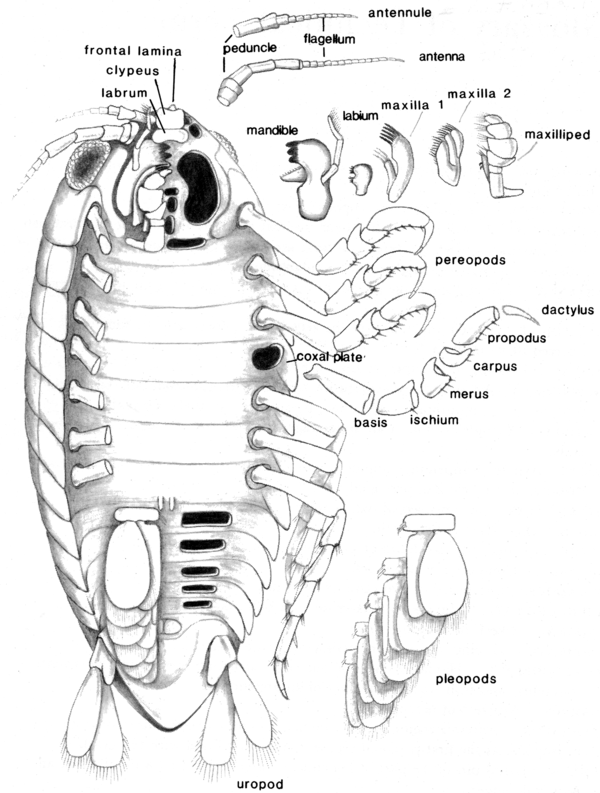See: metastoma [Martin, 2005].
Flat, non-segmented, bilobed structure situated posterior to the oral opening. (Syn. paragnath, lower lip) [Holdich and Jones, 1983].
Paired, laminar mouth parts immediately posterior to the mandibles [Mauchline, 1984].
See: metastoma [McLaughlin, 1980].
(Order Cladocera):
Unpaired, median lip-like structure posterior to mouth. (with/without median keel). (Syn. lower lip, paragnath) [Stachowitsch, 1992].
(Order Cumacea):
Lobe-like structure posterior to mouth. Divided into two lobes. (See also labrum). (Syn. lower lip) [Stachowitsch, 1992].
(Order Tanaidacea):
Lobe-like structure posterior to mouth. Divided into two main lobes (para-gnaths) which may bear hairs, spines, or comb-like rows of short setae, (with/without palp). (Syn. lower lip, hypopharynx) [Stachowitsch, 1992].
(Order Decapoda):
Lip-like structure posterior to mouth on underside of head; symmetrically bilobed, each lobe being termed paragnath. (paragnath: oval, distally attenuated, sinuous). (Syn. metastome, hypostoma, hypostome, hypopharynx, paragnath) [Stachowitsch, 1992].
(Order Amphipoda):
Lobe-like structure posterior to mouth. Typically divided into two lobes (paragnaths), each of which may be further subdivided into a large section (outer lobe), a median inner lobe, and a posterolateral extension (mandibular lobe). (Syn. lower lip) [Stachowitsch, 1992].
(Order Isopoda):
Lobe-like structure posterior to mouth. Typically divided into two lobes (paragnaths). (Syn. lower lip, hpopharynx, posterior lip) [Stachowitsch, 1992].
(Order Isopoda):
Lower lip; usually consisting of a pair of lobes posterior to the mouth [Kensley and Schotte, 1989].
( )
)
 )
)Schematic representation of an isopod illustrating morphological terms. [Kensley and Schotte, 1989]
(Order Isopoda):
The posterior border of the buccal field; the "lower lip" (see paragnath) [Wetzer et al. 1997].
(Order Mysida):
Lobe-like structure posterior to mouth. Divided into two welldeveloped lobes (paragnaths). (Syn. lower lip) [Stachowitsch, 1992].
(Order Stomatopoda):
Lip-like structure posterior to mouth and mandibles on underside of head (cephalon); bulbous and bilobed, each fringed lobe being termed paragnath. (Syn. lower lip) [Stachowitsch, 1992].
(Order Leptostraca):
Lobe-like structure posterior to mouth; divided into two lobes (paragnaths). (Syn. lower lip) [Stachowitsch, 1992].
(Subclass Branchiura):
Lower lip, paragnath [Stachowitsch, 1992].
(Subclass Copepoda):
Lip-like structure posterior to mouth on underside of head; bilobed, each lobe being termed paragnath. May be drawn out, along with upper lip (labrum), into cone-like structure (mouth cone). (Syn. lower lip) [Stachowitsch, 1992].
(Subclass Copepoda):
The lower lip; a median lobe derived from the fusion of the paragnaths, forming the posterior wall of the oral cone in siphonostomatoids [Boxshall and Halsey, 2004].
(Class Ostracoda):
Lip-like structure posterior to mouth on underside of head. May be bilobed, each lobe being termed paragnath. (Syn. lower lip, hypostome) [Stachowitsch, 1992].
(Superorder Syncarida):
Paragnath [Stachowitsch, 1992].
(Order Thermosbaenacea):
Lobe-like structure posterior to mouth; relatively elongate, with terminal spines or setae. (See also labium). (Syn. lower lip) [Stachowitsch, 1992].
(Order Euphausiacea):
Lobe-like structure posterior to mouth; divided into two lobes (paragnaths). (Syn. lower lip) [Stachowitsch, 1992].
Crustacea glossary. Natural History Museum of Los Angeles County. 2011.